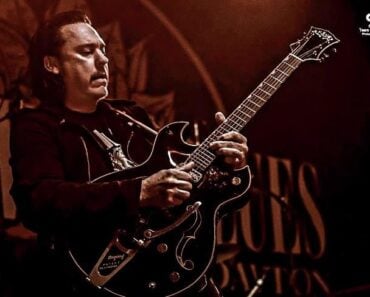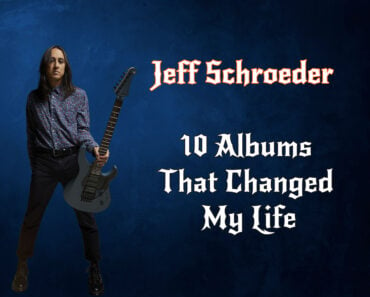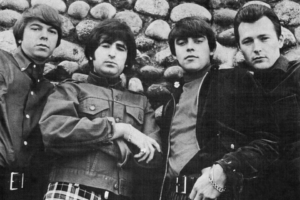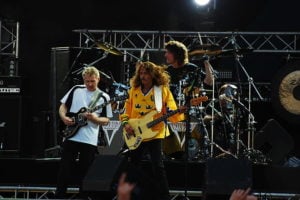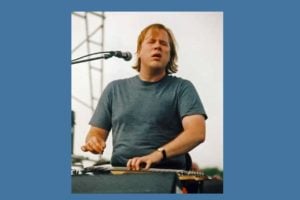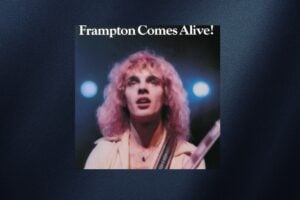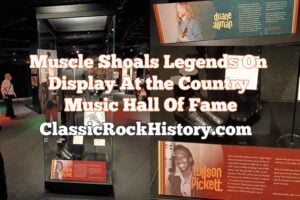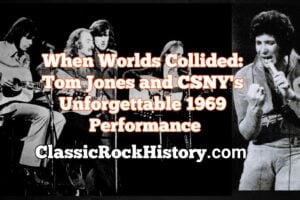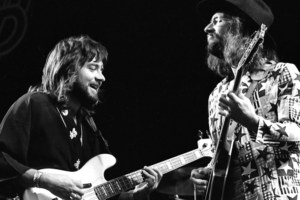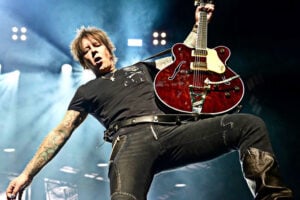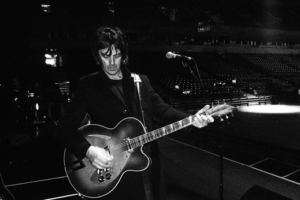
Feature Photo: Courtesy of Chris Pinnick
Surely, at one point or another, you’ve dug on Biggie Smalls’ cut, “Hypnotize,” from his hit 1997 album, Life After Death… “Biggie, Biggie, Biggie, can’t you see? Sometimes your words just hypnotize me…”
Anyway, did you know that the main sample from that song was culled from Herb Alpert’s 1979 chart-topper, “Rise?” If not, now you know. But more importantly, the man who laid down the echo-laden guitar bits and bobs within Alpert’s original version, which, of course, made it into Biggie’s ‘90s banger, is none other than Chris Pinnick.
And wouldn’t you know it? Pinnick knew the song was as good as gold from the jump, telling ClassicRockHistory.com: “I thought ‘Rise’ was a great song. It has a brilliant melody, and the groove is amazing. It had all the ingredients for a hit record. It was also my first gold record.”
Elsewhere, specifically after he was done recording with Alpert, Pinnick was tabbed by Chicago’s drummer, Danny Seraphine, as the band’s next guitarist, albeit in a “hired gun” capacity. This arrangement lasted until the mid-’80s, when Pinnick admits to “not being in a great place in life,” leading to his departure from Chicago’s ranks.
In the years since, Pinnick has continued to do sessions… and collect royalty checks, thanks to good ol’ Biggie’s sampling of “Rise” for “Hypnotize.” He says, “I am not sure about Herb Alpert’s view on sampling, but it worked out well for all the players!”
As for what lies ahead, Pinnick shrugs, “I hope to keep playing until the end. I do a lot of studying now again… my big hope is that I can play parts that people enjoy and work well in their projects. Guitar playing still makes me very happy.”
What inspired you to pick up the guitar, and who were your favorite players?
I started playing in the third grade, at about eight years old. My influence came from my dad at that time. Chet Atkins and Hank Garland mostly. At about 14 or 15, I started listening to Jeff Beck, B.B. King, John McLaughlin, and many more. I also loved the famous Tele players Roy Buchanan and Danny Gatton.
What was your local scene like, and how did it impact you?
In LA, there was a great club scene. We could go almost anywhere and see great players sit in and network. Most of my gigs have come from playing in clubs. Meeting other players and just being heard.
What was the moment when you felt like you found your sound, and what did that look like?
My sound came from experimentation. Trying different amps and pedals. Mostly a ‘70s Fender Telecaster with a humbucker in the neck and a Fender Deluxe. In the early days, I did use an MXR compressor and an Echoplex.
How did you get into session work, and what was your rig like then?
I had started doing casuals like weddings and corporate events. Doing those gigs really helped my sightreading. I started getting calls for jingles and demos from some of the other players on the casuals… Mostly word of mouth. In my early years in the studio.
I mostly used a Fender Deluxe and a few guitars to hopefully cover what would be needed. I had a Fender Tele, a Gibson ES-335, and a Gibson Les Paul. In the ‘80s, I used a rack with a bunch of gear in it, a Soldano Preamp TC 2290, and a Roland Reverb.
How did you up on Herb Alpert’s Rise album?
Once again, meeting people. I met guitarist Andy Armer playing clubs in Venice, California. Andy and Randy “Badazz” Alpert, Herb’s cousin, started working with Herb on an album project, and they wrote the song “Rise.” They hired me to play on a few songs on the record. I got to play with Tim May also on guitar.
What’s the story behind the title track, “Rise?” How did you come up with your parts, what gear did you use, and was Herb very picky about your approach?
On the Rise sessions, I used a very basic rig: a Fender Deluxe and a Mesa Boogie. We also used a Roland Space Echo and the old grey Boss Chorus pedal. Herb Alpert was very low-key, and he relied heavily on the musicians and producers. And he did hire some great players.
My parts were mostly for effect. Most of the time on sessions, I play, hopefully, what the song needs. And “Rise” needed the echo guitar in the beginning, so I used the Roland Space Echo for that. Most of the parts were done as overdubs.
Soon after, you joined Chicago. What led to that? Was there an audition? Were you a big Terry Kath fan?
I joined Chicago in 1979-80. Danny Seraphine was one of the producers I was working for. He called and asked if I would play guitar on the Chicago “thumbprint” album, 14, I think. After we finished the record, they asked me to go on tour. There was no audition. Many people at the time thought my style was close to Terry Kath’s. I love Terry Kath—a master at rhythm playing and such a great feel.
What was your typical rig like with Chicago, and did you have to mimic Terry’s sound?
Mostly on tour, I used a Fender Deluxe and Fender Concert, and some Boss Pedals, like an Overdrive, Phaser, Chorus, Roland Space Echo, and a Reverb. When the hits came out in the ‘80s, I used a modified Fender Deluxe by Paul Rivera.
Most guitar players had one. The modified Deluxe had a gain boost that was great for power chords and solos. But I did not have to mimic Terry Kath’s sound, but playing a [Fender] Telecaster that was similar to his came close!
Some reports say you were never a full-time member. Is that true? Why did you leave?
I was hired as a side man in Chicago. That was fine with me. I was listed with the band on the credits of 17, I think. I have always enjoyed being a sideman. Much less worries and all I had to do was show up and play.
In about ’84, or ’85, the band had the big hits they wanted someone with a more rock ‘n’ roll
image. I was not in the best of places in my life… I had to copy Steve Lukather and Michael Landau’s parts because David Foster did not even want to use the band on the records. In those days, most producers had players that they used exclusively.
In 1997, hip-hop artist Biggie Smalls sampled “Rise” for his song “Hypnotize.” What were your thoughts on that?
The sampling of “Rise” turned out great for me. We got residual every time the sample was used. So, I was thrilled Biggie sampled it! [Laughs]
What is your rig like now, and what’s the key to your tone?
Today, I work only at home. I use Cubase and record tracks for demos and projects for people. I mostly use software called S-Gear, a wonderful amp modeler. Sometimes, I mic and amp, but very rarely. And I’m still using my Fender Tele from the Chicago days. It’s a custom that Tele Eric Chaz built, and a Sire Strat-style guitar.
Check out similar articles on ClassicRockHistory.com Just click on any of the links below……
Tony Obrohta of Chicago: 10 Albums That Changed My Life
Complete List Of Chicago Albums And Songs
Read More: Artists’ Interviews Directory At ClassicRockHistory.com
Read More: Classic Rock Bands List And Directory





